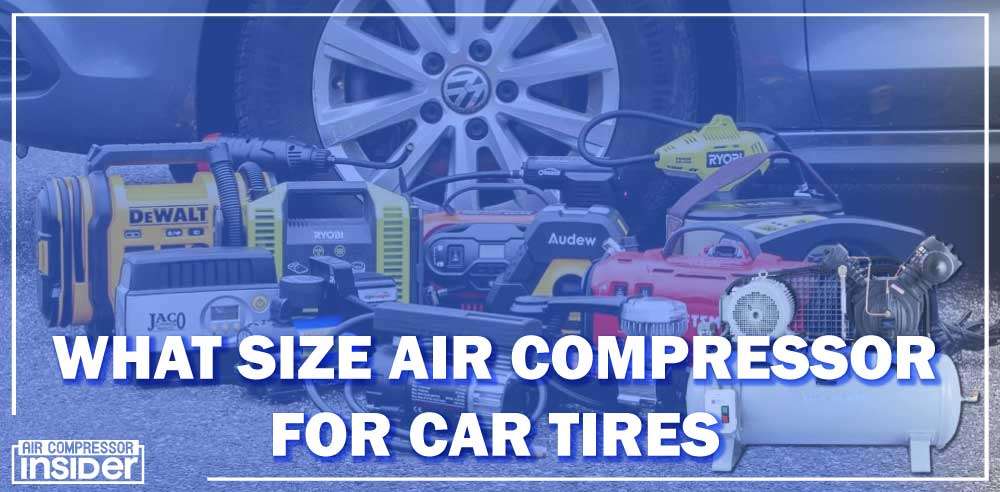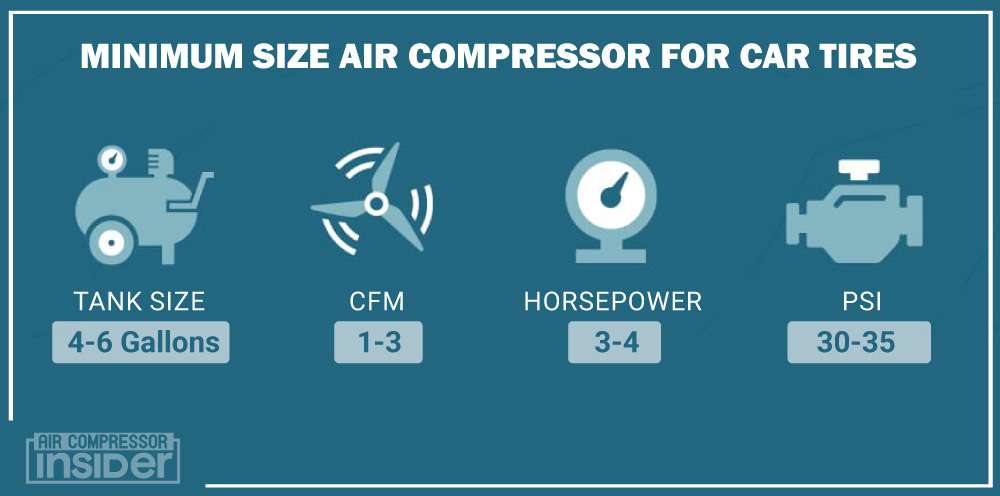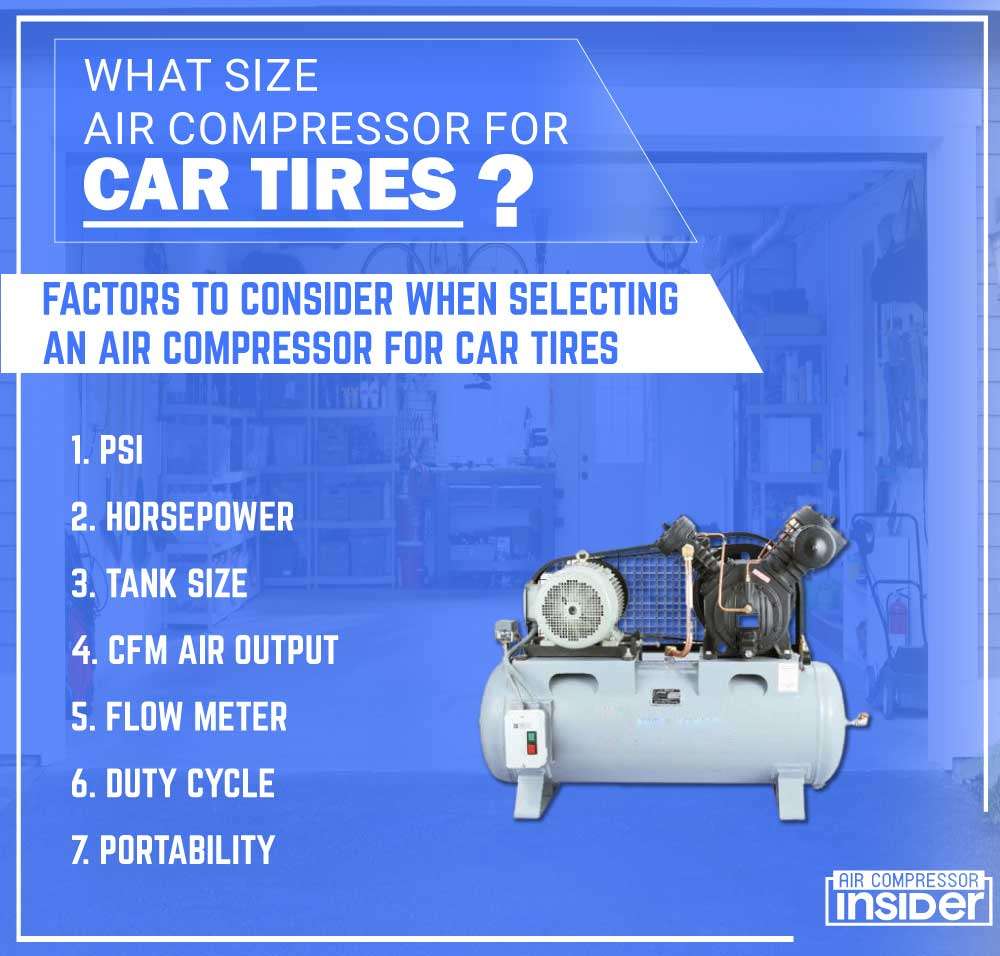If you’re a car enthusiast, then it’s likely that at some point in time you’ve asked yourself the question – what size air compressor for car tires? It can be a difficult question to answer as there are different types of compressors available and all have different capacities.
With this guide, refilling those tires on your car won’t be as intimidating as it may sound. Covering everything from the most popular sizes and their capabilities, ideal PSI ratings, emergency situations where power is limited or noise is an issue, plus much more. So lets start!
What Size Air Compressor For Car Tires
The most popular sizes of air compressor for car tires are usually in the range of 2-6 gallons. The larger the tank, the more air it can hold and deliver at a time, which makes it ideal for refilling all four tires. Generally, you want to look for an air compressor that delivers between 1-3 CFM (Cubic Feet per Minute) at 90 psi (Pounds per Square Inch).

- What Size Air Compressor For Car Tires
- 7 Important Factors to Consider When Selecting an Air Compressor for Car Tires:
- 1. PSI Rate:
- 2. Horse Power:
- 3. Tank Size:
- 4. CFM Air Output:
- 5. Flow Meter:
- 6. Duty Cycle:
- 7. Portability:
- Pressure Requirement for Car Tires:
- Flow Rate Requirement for Car Tires:
- Horsepower Requirement for Car Tires:
- Tank Size Requirement for Car Tires:
- Flow Meter Requirement for Car Tires:
- Duty Cycle Requirement for Car Tires:
- Portability Requirement for Car Tires:
- Do I Need An Air Compressor For Car Tires?
- Frequently Asked Questions
- Conclusion:
- 7 Important Factors to Consider When Selecting an Air Compressor for Car Tires:
For car tires, you’ll likely need an air compressor with a CFM rating of at least 1 to 3 and a PSI rating between 30-35. HP should be in the range of 3-4, and the gallon size should be around 4-6 gallons or higher.

7 Important Factors to Consider When Selecting an Air Compressor for Car Tires:

The most important factors to consider when selecting an air compressor for car tires is PSI (Pounds per Square Inch), HP (Horsepower), tank size, flow meter, duty cycle and portability.
1. PSI Rate:
The higher the PSI ratings on a compressor, the more powerful it is and the faster it will be able to fill the tires. Most car tires will require a minimum of 90 PSI, so you should look for an air compressor with at least this rating.
2. Horse Power:
The horsepower (HP) of an air compressor is another important factor to consider as it determines how much pressure the machine can deliver and how quickly it can do so. The higher the HP, the more powerful and efficient the compressor is and it will be able to fill your tires faster.
3. Tank Size:
The size of the tank on an air compressor determines how much air it can store at a time. If you have larger car tires that require more air, then you’ll need a bigger tank size to fill them up effectively.
4. CFM Air Output:
The horsepower (HP) of an air compressor is another important factor to consider as it determines how much pressure the machine can deliver and how quickly it can do so. The higher the HP, the more powerful and efficient the compressor is and it will be able to fill your tires faster.
5. Flow Meter:
A flow meter will help you determine how much air is in each tire and the rate at which it’s being filled. This ensures that you don’t overfill or underfill your car tires, which can cause damage or even a potential road hazard.
6. Duty Cycle:
The duty cycle of a compressor tells you how long it can run continuously before needing to stop and cool down. Higher power compressors will usually have longer duty cycles, making them ideal for larger jobs or emergency situations when time is an issue.
7. Portability:
If you’ll be using the air compressor on different cars or in different locations then you’ll want to look for one that is lightweight and portable. Some models come with wheels or handles, making them easier to transport around.
By understanding these important factors, you can be sure to select the perfect size air compressor for your car tires. With a reliable and efficient compressor in hand, you can then get to work with confidence, knowing that your tool will power through every project without fail!
Now let’s discuss these factors one by one in detail.
Pressure Requirement for Car Tires:
The recommended pressure for car tires varies depending on the make and model of your vehicle. The pressure can be found in the owner’s manual or on a sticker located inside the driver’s side door frame. Once you know this information, you’ll want to look for an air compressor that has a minimum PSI rating of at least 90.
Flow Rate Requirement for Car Tires:
The flow rate refers to the amount of air that comes out of the compressor, measured in cubic feet per minute (CFM). Most car tires will require 1-3 CFM to work properly. Again, a flow meter can help you determine the exact CFM required for your nail gun.
Horsepower Requirement for Car Tires:
The horsepower (HP) of your air compressor will determine how efficiently and quickly it can fill the tires. The higher the HP, the more powerful and efficient your compressor is, allowing you to refill all four tires in a shorter amount of time. Generally speaking, a 3-4 HP rating should be enough for most car owners.
Tank Size Requirement for Car Tires:
The size of the air tank on an air compressor determines how much air it can store at a time. If you have larger car tires that require more air, then you’ll need a bigger tank size to fill them up effectively. Generally speaking, look for one with a minimum tank size of 3 gallons if you need basic power or 6 gallon air compressor if you need more power.
Flow Meter Requirement for Car Tires:
A flow meter is an important feature on any air compressor and it allows you to measure the rate at which your tires are being filled. This ensures that you don’t overfill or underfill your car tires, preventing potential damage or even a possible road hazard.
Duty Cycle Requirement for Car Tires:
The duty cycle of a compressor tells you how long it can run continuously before needing to stop and cool down. Higher power compressors usually have longer duty cycles, making them ideal for larger jobs or emergency situations when time is an issue.
Portability Requirement for Car Tires:
If you’ll be using the air compressor on different cars or in different locations then you’ll want to look for one that is lightweight and portable. Some models come with wheels or handles, making them easier to transport around.
Choosing the right size air compressor for car tires can be tricky but following these guidelines should help make selecting the perfect model a lot easier.
Do I Need An Air Compressor For Car Tires?
If you have a car, it is likely that at some point in time you will need to inflate your tires. A simple home garage air compressor makes this task much easier and more efficient than using an old-fashioned pump. Air compressors are also able to fill your tires quickly and accurately ensuring that they are not overfilled or underfilled. For this reason, we recommend that all car owners have an air compressor on hand.
Frequently Asked Questions
Question #1
What size air compressor do I need for car tires?
The recommended pressure for car tires varies depending on the make and model of your vehicle. Generally speaking, you should look for an air compressor with a minimum PSI rating of at least 90 and a horsepower (HP) rating of 3-4 HP. A tank size of 3-6 gallons should be sufficient depending on your needs.
Question #2
Is an air compressor necessary for car tires?
Yes, an air compressor is a must-have tool for all car owners. It allows you to quickly and accurately fill up your tires, ensuring that they are not overfilled or underfilled.
Question #3
What features should I look for in an air compressor?
Look for a compressor with a minimum PSI rating of at least 90 and a horsepower (HP) rating of 3-4 HP. Additionally, it’s important to consider the tank size (3-6 gallons), flow meter, duty cycle, and portability when selecting the best air compressor for your needs.
Question #4
Can I use an air compressor to inflate other car components?
Yes, you can use an air compressor to fill up other car parts such as shock absorbers and radiators. However, it’s important to make sure that the pressure of the air is not too high as this can cause damage to certain components.
Question #5
Does a bigger tank size mean more power?
Generally speaking, yes. A larger tank size on an air compressor will give you more power when filling up your tires as it will be able to store more air pressure at once.
Question #6
Is it safe to use a flow meter?
Yes, a flow meter is an important feature on any air compressor and it allows you to accurately measure the rate at which your tires are being filled. This ensures that you don’t overfill or underfill your car tires, preventing potential damage or even a possible road hazard.
Question #7
What is the duty cycle of an air compressor?
The duty cycle of a compressor tells you how long it can run continuously before needing to stop and cool down. Higher power compressors usually have longer duty cycles, making them ideal for larger jobs or emergency situations when time is an issue.
Question #8
Is portability important when choosing an air compressor?
If you’ll be using the air compressor on different cars or in different locations then you’ll want to look for one that is lightweight and portable. Some models come with wheels or handles, making them easier to transport around.
Question #9
What size air hose should I get for my car tires?
The recommended size for an air hose for your car tires should be 3/8″ ID (inside diameter) or larger. You may want to get a longer length depending on the reach of the compressor.
Question #10
Are there any safety precautions when using an air compressor?
Yes, there are some important safety precautions that you should take when using an air compressor such as wearing protective gear like goggles and gloves, keeping children away from the area, and avoiding contact with any moving parts. Additionally, always make sure that you check the pressure of your car tires after filling them up to ensure that they are not overfilled or underfilled.
Conclusion:
Air compressor is an important tool for car owners as it allows them to quickly and accurately fill up their tires. When choosing the right size air compressor for car tires, you should consider the PSI rating, horsepower (HP) rating, tank size, flow meter and duty cycle in order to select the best model for your needs. Additionally, always make sure that you take the necessary safety precautions when using an air compressor. Following these tips should help make your car tire refilling experience hassle-free.
